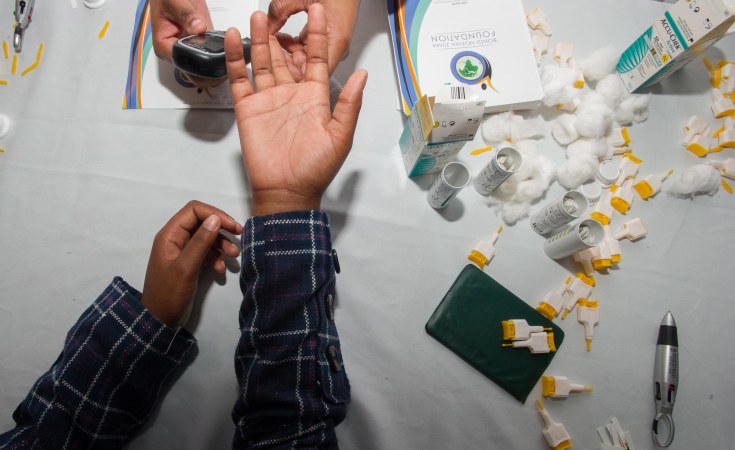WHO's Director-General, Tedros Ghebreyesus, said there has been an increase in the number of diabetes cases over the past three decades.
The World Health Organisation (WHO) in a statement on Wednesday has raised an alarm over the skyrocketing number of diabetes cases worldwide.
The global health body noted that global diabetes cases have skyrocketed, exceeding 800 million adults, a four-fold increase since 1990, as revealed in a recent study published in The Lancet on World Diabetes Day.
The study conducted by the NCD Risk Factor Collaboration (NCD-RisC) with WHO's support, underscores the alarming scope of the diabetes epidemic, emphasising the urgent need for intensified global efforts to tackle escalating disease rates and expanding treatment disparities, especially in low- and middle-income countries.
WHO's Director-General, Tedros Ghebreyesus, said there has been an increase in the number of diabetes cases over the past three decades.
He said: "We have seen an alarming rise in diabetes over the past three decades, which reflects the increase in obesity, compounded by the impacts of the marketing of unhealthy food, a lack of physical activity and economic hardship.
"To bring the global diabetes epidemic under control, countries must urgently take action. This starts with enacting policies that support healthy diets and physical activity, and, most importantly, health systems that provide prevention, early detection and treatment."
Prevalence of diabetes
According to the researchers, between 1990 and 2022, global diabetes prevalence among adults surged from 7 per cent to 14 per cent, with low- and middle-income countries (LMICs) experiencing the most significant increases, adding that despite this alarming rise, treatment access in LMICs remains woefully inadequate.
They reported that in 2022, approximately 450 million adults aged 30 and older accounted for 59 per cent of all adults with diabetes and lacked treatment. This represents a 3.5-fold increase in untreated individuals since 1990. Most concerning, 90 per cent of these untreated adults reside in LMICs.
The study also uncovered significant regional disparities in diabetes prevalence, with the WHO South-East Asia and Eastern Mediterranean Regions reporting notably high rates, affecting approximately 20 per cent of adults aged 18 and older.
Disturbingly, these regions, along with the African region, have alarmingly low diabetes treatment coverage. Fewer than 40 per cent of adults with diabetes in these areas receive glucose-lowering medication, highlighting a critical need for improved access to diabetes care.
Responses
In response to tackle the growing diabetes burden worldwide, WHO said it is launching a new global monitoring framework to track key indicators like glycaemic control, hypertension, and access to essential medicines.
This standardised approach, it believes, will enable countries to prioritise resources effectively, driving significant improvements in diabetes prevention and care.
The global health body noted that its Global Diabetes Compact, launched in 2021, was aimed at reducing the risk of diabetes and ensuring equitable access to comprehensive, affordable, and quality treatment and care.
This initiative also focuses on preventing type 2 diabetes by addressing obesity, unhealthy diets, and physical inactivity.
Additionally, the World Health Assembly endorsed a diabetes resolution in 2021, urging member states to prioritise diabetes prevention, diagnosis, control, and management of risk factors like obesity.
The statement reads in part: "In 2022, WHO established five global diabetes coverage targets to be achieved by 2030. One of these targets is to ensure that 80 per cent of people with diagnosed diabetes achieve good glycemic control. Today's release underlines the scale and urgency of action needed to advance efforts to close the gap."
According to the global body, the year 2025 is shaping up to be a game-changer in the fight against diabetes worldwide with the Fourth High-level Meeting of the United Nations General Assembly on noncommunicable diseases (NCDs) which is set to take place in September, bringing together heads of states and governments to tackle the alarming rise in diabetes cases.
This meeting is a critical opportunity for global leaders to unite and set a powerful vision for preventing and controlling NCDs, including diabetes, they revealed adding that the stakes are high, with someone under the age of 70 dying from an NCD every two seconds.
It noted that the meeting aims to address the root causes of NCDs, improve access to detection and treatment, and strengthen global health systems, including primary healthcare.
By aligning efforts towards the 2030 and 2050 goals, they stated that high-level meetings can halt the rise in the diabetes epidemic and save countless lives.
Diabetes
Diabetes is a condition where one's blood glucose level is too high due to insufficient insulin production or ineffective insulin use.
There are three main types of diabetes: Type 1, Type 2, and Gestational diabetes.
Type 1 diabetes is characterised by the body's inability to produce enough insulin, requiring daily insulin administration while type 2 diabetes occurs when the body doesn't use insulin effectively, leading to high blood sugar levels if left untreated and gestational diabetes develops during pregnancy, causing hyperglycemia, but usually resolves after giving birth.
Common symptoms of diabetes include increased thirst and urination, blurred vision, fatigue, and numbness or tingling in the feet or hands.
Early diagnosis is crucial to prevent complications, and treatment options include medication, insulin injections, and lifestyle modifications.


